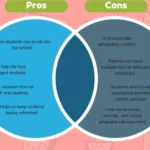Homework has been a topic of debate among educators, parents, and students for many years. While some argue that it is an essential part of the learning process, others believe that it is a burden on students and their families. In this article, we will examine the benefits of homework for both teachers and students, as well as the challenges that may arise. From reinforcing learning to fostering responsibility and self-discipline, homework has many advantages that cannot be ignored. However, we must also address the concerns of overloading students with homework and ensuring that it reinforces learning. Join us as we explore the pros and cons of homework and find solutions to the challenges it presents.
Contents
- Benefits of Homework for Teachers
- Benefits of Homework for Students
- Challenges and Solutions
- Conclusion
-
Frequently Asked Questions
- What are some benefits of homework for students?
- What are some benefits of homework for teachers?
- What can be done if students are overloaded with homework?
- What can be done if students resist doing homework?
- How can homework help students develop time-management skills?
- What can teachers do to help students with homework?
- What are some solutions to homework challenges?
- Can homework be personalized for individual students?
- Can homework improve students’ independent learning skills?
- What are some potential drawbacks of homework?
- References
Benefits of Homework for Teachers

Homework is an essential tool for teachers to reinforce learning, assess student understanding, and personalize learning. It also encourages parental involvement in their child’s education and helps students develop time-management skills. With homework, teachers can provide extra practice and review for students to solidify their learning. Homework assignments can also be tailored to individual students’ needs, allowing teachers to differentiate instruction and provide extra support where necessary. Additionally, homework can be used as a tool to assess student understanding and identify areas where students may need additional support. By assigning homework, teachers can also encourage parents to take an active role in their child’s education and provide support at home. Finally, homework helps students develop time-management skills, which are essential for success in school and beyond.
1. Reinforcing Learning
Homework is considered an effective way to reinforce learning as it provides students with an opportunity to practice what they have learned in class. By doing homework, students can apply the knowledge they have gained in class to real-world situations. This helps to reinforce the concepts they have learned and deepen their understanding of the subject matter. Additionally, homework can be used by teachers to identify areas where individual students may be struggling, and provide additional support where needed. It is important, however, that homework is designed to reinforce learning and not just to keep students busy. Teachers should assign homework that is relevant to the curriculum and is aligned with the learning objectives of the lesson. By doing so, students are more likely to engage with the material and gain a deeper understanding of the subject matter. Teachers can also use various resources such as teaching-freebies, quizlet-plus-student-discount, national-geographic-education, abc-mouse-promo, 3d-puzzles-for-kids, interactive-globe-for-kids, abcmouse-for-teachers, money-puzzles, is-rosetta-stone-free, and best-ant-farm to make homework more engaging and interactive, which can further reinforce learning.
2. Assessing Student Understanding
Homework is a valuable tool for teachers to assess student understanding. By assigning homework, teachers can identify areas where students are struggling and adjust their teaching accordingly. Homework also provides teachers with a way to evaluate student progress over time. By reviewing completed assignments, teachers can see how well students are retaining information and mastering new skills. This feedback allows teachers to make informed decisions about how to best support their students. Additionally, homework assignments can be used to prepare students for upcoming assessments, allowing them to practice and reinforce their learning. Tools such as Quizlet Plus Student Discount or National Geographic Education can be used to create engaging homework assignments that help students learn and retain information. By leveraging these tools, teachers can provide personalized learning experiences that meet the needs of each student.
3. Personalized Learning
One of the most significant benefits of homework is personalized learning. Homework allows teachers to assign tasks that cater to the individual needs of each student. For example, if a student is struggling with a particular concept, the teacher can assign more homework related to that concept to reinforce learning. This way, homework can help students improve their understanding of the subject and work towards achieving their academic goals.
Personalized learning also allows students to work at their own pace. They can take as much time as they need to complete the homework, and if they are struggling with a particular task, they can seek help from their teacher or peers. This helps students develop independent learning skills, which are essential for academic success.
Personalized learning helps teachers gauge each student’s strengths and weaknesses and provide them with the necessary support. Teachers can use homework to identify areas where students need additional support and provide them with extra resources, such as teaching-freebies or interactive globe for kids. This can help students develop a deeper understanding of the subject and improve their overall academic performance.
Personalized learning is one of the most significant benefits of homework. It allows students to work at their own pace, reinforces learning, and provides teachers with an opportunity to identify each student’s strengths and weaknesses. By leveraging homework as a tool for personalized learning, teachers can help students achieve their academic goals and improve their overall academic performance.
4. Encouraging Parental Involvement
Encouraging parental involvement in homework assignments is an essential benefit of homework. When parents get involved in their children’s homework, they show that they value education. They also get to know what their children are learning in school and can help them in areas where they are struggling. This involvement can increase the communication between parents and teachers, which can lead to a better understanding of the child’s needs. Parents can also provide their children with a quiet place to study and offer guidance on how to approach assignments.
One way to encourage parental involvement is to provide parents with a clear understanding of what their children are learning. Teachers can do this by sending home weekly newsletters that outline what the children will be learning that week and what assignments they will be given. This can help parents to understand what their child is studying and how to help them.
Another way to encourage parental involvement is to hold parent-teacher conferences. This allows parents to meet with teachers and discuss their child’s progress, strengths, and weaknesses. Teachers can also provide parents with tips on how to help their children with homework.
Finally, teachers can encourage parents to participate in homework assignments by providing them with resources that they can use to help their children. These resources could be online educational games, interactive puzzles, or other learning tools. Teachers can also recommend educational websites, such as ABC Mouse, which provides interactive learning activities for children.
Encouraging parental involvement in homework assignments is a crucial benefit of homework. It can increase communication between parents and teachers, provide students with a quiet place to study, and offer guidance on how to approach assignments. Teachers can encourage parental involvement by providing a clear understanding of what their children are learning, holding parent-teacher conferences, and providing resources that parents can use to help their children.
5. Developing Time-Management Skills
Homework is an excellent way for students to develop time-management skills. With homework, students learn to plan and organize their time effectively. They also learn to prioritize tasks, set deadlines, and manage their workload. Developing these skills at an early age can help students to be more productive and efficient throughout their lives.
One effective way for students to develop time-management skills is to create a schedule or to-do list. This can help students to stay on track and ensure that they complete all their assignments on time. Teachers can also help students to develop these skills by providing clear instructions and deadlines. They can encourage students to break down larger assignments into smaller, manageable tasks.
Another way to develop time-management skills is to use online tools and resources. Many educational websites offer free resources such as printable planners, study schedules, and time-management tips. For example, teachers can direct students to visit teaching-freebies for free printable planners and schedules, or to ABC Mouse for interactive tools that help students to manage their time effectively.
Homework provides students with an opportunity to develop time-management skills that are essential for success in academic and personal life. By encouraging students to plan and organize their time effectively, teachers can help them to become more productive, responsible, and self-disciplined individuals.
Benefits of Homework for Students

Homework is an essential part of the education system and provides numerous benefits for students. Firstly, homework reinforces learning and helps students to retain knowledge. It also prepares students for exams, develops independent learning skills, fosters responsibility and self-discipline, and improves time-management skills. These skills are crucial for success in both academics and future careers. Additionally, homework allows students to practice their critical thinking and problem-solving skills. Despite the challenges of overloading students with homework or assigning homework that doesn’t reinforce learning, there are solutions to these challenges. Teachers can help students with homework by providing feedback, offering support, and utilizing educational tools such as ABCmouse or interactive globes for kids. By acknowledging the benefits of homework and addressing its challenges, students can thrive academically and personally.
1. Reinforcing Learning
Homework has long been a part of the learning process, and one of its main benefits is reinforcing the concepts and skills taught in the classroom. When students complete homework assignments, they are able to better understand and retain the information learned in class. This is because homework provides an opportunity for students to practice what they have learned, which helps to solidify the information in their minds. It also allows students to work at their own pace and review the material as many times as they need to fully understand it.
Homework can help to identify areas where students may be struggling with the material. Teachers can use homework assignments to gauge how well students are understanding the concepts being taught and provide additional support where needed. By reinforcing learning in this way, homework helps to ensure that students are able to build a strong foundation of knowledge and skills that they can draw upon in the future.
To make homework more effective in reinforcing learning, teachers can provide feedback and guidance to students as they complete their assignments. This can take the form of written feedback on assignments, one-on-one meetings to discuss problem areas, or even online resources such as interactive puzzles and games. By providing this additional support, teachers can help students to stay engaged and motivated as they work to reinforce their learning outside of the classroom.
Internal link: If you are looking for a fun and interactive way to reinforce learning, check out our collection of 3D puzzles for kids. These puzzles are designed to challenge and engage children of all ages, helping them to build important problem-solving and critical thinking skills.
2. Preparing for Exams
Homework is an essential tool for preparing students for exams. Through homework assignments, students can reinforce their understanding of the course material and identify areas where they need additional study. By completing homework assignments, students can also develop the skills necessary to succeed on exams, such as time management, organization, and critical thinking. Homework can also help students to practice the types of questions that will be on the exam, giving them the confidence they need to perform well.
To make the most of homework as a tool for exam preparation, students should approach each assignment with the goal of mastering the material. They should take the time to review their notes and textbooks, and to ask questions if they don’t understand something. Teachers can also help students prepare for exams by providing clear guidelines for homework assignments and by giving feedback on completed assignments. By working together, teachers and students can ensure that homework assignments are effective tools for exam preparation.
For additional resources to help students prepare for exams, parents and teachers can check out interactive educational tools like Interactive Globe for Kids, ABCmouse for Teachers, and Money Puzzles. Additionally, students can use language learning programs like Rosetta Stone to reinforce their understanding of course material and prepare for exams.
3. Developing Independent Learning Skills
Homework plays a crucial role in the development of independent learning skills in students. When students work on homework assignments, they have the opportunity to practice working independently and taking ownership of their learning. This helps them to become more self-directed and confident learners, which is a valuable skill for their future academic and professional success.
To develop independent learning skills, students need to be given the opportunity to take responsibility for their own learning. Homework assignments that require students to research, analyze, and synthesize information on their own can help them to develop these skills. Additionally, homework that encourages students to think critically and solve problems independently can also help them to become more independent learners.
Teachers can support the development of independent learning skills by providing students with clear expectations and guidelines for completing homework assignments. They can also provide feedback that encourages students to reflect on their own learning and identify areas for improvement. By giving students the tools and support they need to become independent learners, teachers can help them to succeed not only in school, but also in life.
Developing independent learning skills is one of the key benefits of homework for students. Through homework assignments that encourage self-directed learning and problem-solving, students can develop the skills they need to become confident, independent learners who are prepared for success in the future.
4. Fostering Responsibility and Self-Discipline
Homework can help students to develop responsibility and self-discipline, which are essential skills for success in any field. By completing homework assignments on time and to the best of their ability, students learn to take responsibility for their own learning. This fosters a sense of independence and self-motivation that can carry over into other areas of their lives.
One way to foster responsibility and self-discipline through homework is to assign long-term projects that require planning and organization. For example, a research paper on a chosen topic may be assigned at the beginning of a semester, with various milestones such as topic selection, research, and drafting due throughout the semester. This type of project requires students to manage their time effectively, set goals, and monitor their progress toward those goals. These skills are transferable to other areas of life, such as work and personal projects.
Another way to promote responsibility and self-discipline is to provide students with choice in their homework assignments. By allowing students to choose the topic or format of their assignments, teachers empower students to take ownership of their learning and customize their assignments to their own learning styles and interests. This can also increase engagement and motivation, as students are more likely to be invested in assignments that they have chosen themselves.
Teachers can also foster responsibility and self-discipline by providing timely feedback on homework assignments. When students receive feedback on their work, they can use that feedback to make improvements and take ownership of their learning. By providing feedback in a timely manner, teachers can also help students to stay on track and avoid falling behind.
Homework can be an effective tool for fostering responsibility and self-discipline in students. By assigning long-term projects, providing choice in assignments, and giving timely feedback, teachers can help students to take ownership of their learning and develop essential skills for success in any field.
5. Improving Time-Management Skills
Homework is a great way to improve time-management skills among students. When students have a deadline for homework, they need to manage their time effectively to complete the task on time. Time-management is important not only for academics but also for future professional environments. Completing homework on time will help students to develop a sense of responsibility and punctuality which are important skills for success in any field. Additionally, students who learn to manage their time effectively will be able to prioritize their commitments and tasks, which will help them in their future career. Teachers can help students to improve their time-management skills by providing them with deadlines for homework and encouraging them to plan out their work in advance. By doing so, they can learn to manage their time effectively and complete their homework on time.
Homework is not just about completing assignments but also about developing important skills that are essential for success in life. By improving their time-management skills, students can learn to prioritize their commitments and tasks, which will help them in their academic and professional life. It is important for teachers to assign homework that reinforces learning and fosters the development of important skills such as time-management.
Challenges and Solutions
One of the biggest challenges with homework is overloading students with too much work, which can lead to stress and burnout. Another challenge is assigning homework that doesn’t reinforce learning or provide meaningful practice. Some students may also resist doing homework, which can be a barrier to their learning and success. To address these challenges, teachers can implement solutions such as setting clear expectations, providing feedback, and offering support to students who need it. Additionally, teachers can help students with homework by providing guidance, resources, and opportunities for collaboration. By addressing these challenges and implementing effective solutions, homework can become a valuable tool for reinforcing learning and promoting student success.
1. Overloading Students with Homework
Many students these days complain about being overloaded with homework. It can be challenging for them to balance homework with extracurricular activities, family time, and personal interests. Overloading students with homework can lead to stress, anxiety, and burnout. If students are overloaded with homework, they may not be able to complete it all, which can negatively impact their grades.
However, there are solutions to the problem of overloaded homework. Teachers can assign homework based on its importance and relevance to the lesson. They can also provide students with clear instructions and expectations for their homework. Additionally, teachers can offer support to students who are struggling with homework. They can provide extra help during class or after school.
Another solution to overloaded homework is for students to develop better time-management skills. They can create schedules and prioritize their assignments. They can also break down large assignments into smaller, more manageable tasks.
Homework is an important part of the learning process, but it should not overload students. Teachers and students should work together to find a balance that works for everyone. With the right approach, homework can be a valuable tool for reinforcing learning and developing important skills.
2. Homework That Doesn’t Reinforce Learning
One of the biggest challenges with homework is ensuring that it reinforces learning. When students are given busy work or assignments that don’t relate to what they are learning in class, it can be frustrating and demotivating for them. It can also be a waste of time and energy.
To address this challenge, teachers need to carefully consider the assignments they give and make sure they are relevant to what students are learning. One solution is to provide students with homework that is linked to classroom activities and that helps to reinforce key concepts.
Another solution is to offer students a choice in the assignments they complete. This can help to ensure that students are engaged and motivated to do the work. For example, a science teacher might offer students a choice between completing a traditional worksheet or creating a model of an animal cell.
Ultimately, the key to ensuring that homework reinforces learning is for teachers to be intentional in the assignments they give and to provide support and guidance to students as needed. By doing so, teachers can help students develop a deeper understanding of the material and improve their academic performance.
One way to reinforce learning is through hands-on activities such as ant farms. These types of activities can help students to better understand key concepts and engage with the material in a more meaningful way. By incorporating such activities into homework assignments, teachers can help to ensure that the work is both relevant and engaging for students.
3. Resistance to Homework
Despite the numerous benefits of homework, there are still some students who resist doing it. Some common reasons for resistance to homework include feeling overwhelmed by the workload, lack of interest in the subject matter, feeling that the homework is not relevant to their lives, and feeling that the assignments are too difficult.
Resistance to homework can be a real challenge for teachers, who may struggle to motivate students to complete their assignments. One way to address this issue is to make homework assignments more engaging and relevant to students’ lives. Teachers can also work with students to set goals and develop a plan for completing assignments.
Another approach is to provide students with choices in their homework assignments. Giving students a choice in what they study or how they complete assignments can help them feel more invested in the process and more motivated to complete the work. Teachers can also provide feedback and support to students who are struggling with homework, helping them to develop the skills they need to succeed.
It’s also important to recognize that some students may have legitimate reasons for not being able to complete homework, such as lack of resources or support at home. Teachers can work with these students to find alternative solutions, such as providing extra help or resources, or modifying assignments to better suit their needs.
Ultimately, resistance to homework is a complex and multifaceted issue that requires careful consideration and attention from both teachers and students. By working together and finding creative solutions to the challenges that arise, it is possible to help all students succeed in their academic pursuits.
4. Solutions to Homework Challenges
To address the challenges associated with homework, teachers can implement some solutions. One solution is to assign homework that is both meaningful and manageable. This can be achieved by breaking down the assignment into smaller parts and providing clear instructions. Teachers can also differentiate homework assignments to meet the needs of all students, including those with learning disabilities or English language learners.
Another solution is to provide students with feedback on their homework. This can be done through written comments or one-on-one conferences. Feedback helps students understand what they have done well and where they need to improve. It also provides motivation for students to continue to work hard and take ownership of their learning.
Teachers can also involve parents in the homework process. This can be done by sending home newsletters or creating a homework hotline. Parents can also be encouraged to provide a quiet and well-lit space for their child to complete homework, as well as to set aside time each day for homework.
To reduce resistance to homework, teachers can help students understand the purpose of homework and how it relates to their learning. Teachers can also make homework more engaging by incorporating student interests and providing opportunities for choice. This can help students take ownership of their learning and feel more motivated to complete homework assignments.
Finally, teachers can make use of technology to provide students with additional resources and support for homework. This can include online tutorials, videos, and interactive activities. Technology can also be used to provide students with instant feedback on their homework, which can be motivating and help students stay on track.
By implementing these solutions, teachers can help students overcome the challenges associated with homework and reap the benefits of this important learning tool.
5. How Teachers Can Help Students with Homework
Homework can be challenging for students, but with the right guidance and support from teachers, it can also be an opportunity for growth and learning. Here are some ways that teachers can help students with their homework:
1. Provide Clear Instructions: Teachers should give clear and concise instructions for each homework assignment, including the purpose of the task, the expected outcome, and any specific guidelines or requirements.
2. Offer Guidance and Support: Teachers can offer guidance and support to students as they complete their homework, such as answering questions, providing examples, or suggesting resources.
3. Encourage Collaboration: Teachers can encourage students to collaborate on homework assignments by working in pairs or small groups. This can help students learn from each other and develop teamwork skills.
4. Monitor Progress: Teachers should monitor students’ progress on homework assignments and provide feedback and support as needed. This can help students stay on track and improve their understanding of the material.
5. Provide Opportunities for Feedback: Teachers should provide opportunities for students to give feedback on homework assignments, such as asking for their opinions on the difficulty level or how helpful the homework was in reinforcing learning.
By following these strategies, teachers can help students get the most out of their homework assignments and develop important skills that will serve them well throughout their academic and professional careers.
Conclusion
In conclusion, homework has both benefits and challenges for both students and teachers. While it can reinforce learning, prepare students for exams, and develop their independent learning skills, it can also overload them with work and cause resistance. However, teachers can help by personalizing homework assignments, assessing student understanding, and encouraging parental involvement. They can also provide solutions to homework challenges and teach time-management skills. Ultimately, the goal of homework should be to enhance learning and promote responsibility and self-discipline. By finding the right balance, students can benefit from homework and achieve academic success in the long run.
Frequently Asked Questions
What are some benefits of homework for students?
Homework helps students reinforce their learning, prepare for exams, develop independent learning skills, foster responsibility and self-discipline, and improve time-management skills.
What are some benefits of homework for teachers?
Homework allows teachers to reinforce learning, assess student understanding, personalize learning, encourage parental involvement, and develop time-management skills in their students.
What can be done if students are overloaded with homework?
Teachers can consider reducing the amount of homework, prioritizing assignments, and ensuring that homework is meaningful and reinforces learning.
What can be done if students resist doing homework?
Teachers can try to make homework more engaging and relevant to students’ interests and needs, provide support and resources for completing homework, and communicate the importance of homework with students and their families.
How can homework help students develop time-management skills?
Homework requires students to plan and organize their time effectively, which helps them develop time-management skills that are useful both in school and later in life.
What can teachers do to help students with homework?
Teachers can provide clear instructions and expectations for homework assignments, offer support and resources for completing homework, and provide timely feedback on completed assignments.
What are some solutions to homework challenges?
Solutions to homework challenges include reducing the amount of homework, prioritizing assignments, ensuring that homework is meaningful and reinforces learning, and providing support and resources for completing homework.
Can homework be personalized for individual students?
Yes, homework can be personalized for individual students by taking into account their interests, needs, and learning styles.
Can homework improve students’ independent learning skills?
Yes, homework requires students to work independently, which helps them develop independent learning skills such as self-motivation, self-direction, and self-evaluation.
What are some potential drawbacks of homework?
Potential drawbacks of homework include overloading students with too much work, assigning homework that does not reinforce learning, and causing stress and burnout in students.







